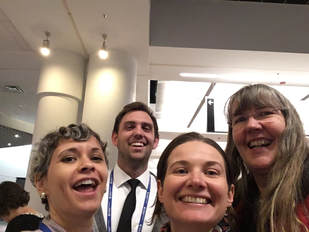Undergraduates - interested in working in the Hunter lab?
We usually have about 4-6 undergrads working in the Hunter laboratory. Paid undergraduates maintain plants, insect cultures, wash pots and cages, conduct diagnostic PCR (polymerase chain reaction) to maintain the symbiont infection status of cultures, and assist with experiments. Paid undergraduates who are interested may also eventually undertake their own research project. Other undergrads may work as volunteers, for course credit, or for an honors thesis; these students have more research, less maintenance in their work mix. If you are interested in working in the lab for pay, it helps if you have work-study status. If not, and you are interested in getting involved, send us an email. We ask volunteers to commit to regular hours and meticulous work habits, and sometimes our lab is simply full, but we're always interested in hearing from you.

David Adkins, Electrical Engineering Major
I am a junior, majoring in Electrical Engineering with a minor in Data Science. I'm also a classically trained composer and musician and a licensed Pharmacy technician. Upon graduation I plan to put my passion for music, electronics and medicine together and make biomedical applications for the hearing impaired in industry or as a Chemical Engineering grad student. Working in the lab has helped me become familiar with lab tools, processes, safety, regulations and workflow. Very glad to be part of the team!
I am a junior, majoring in Electrical Engineering with a minor in Data Science. I'm also a classically trained composer and musician and a licensed Pharmacy technician. Upon graduation I plan to put my passion for music, electronics and medicine together and make biomedical applications for the hearing impaired in industry or as a Chemical Engineering grad student. Working in the lab has helped me become familiar with lab tools, processes, safety, regulations and workflow. Very glad to be part of the team!

Esther Gomez, Veterinary Science Major, Microbiology minor
I am a senior majoring in Veterinary Science with a minor in Microbiology. I also work at a veterinary clinic and currently live with 9 animals that consist of dogs, cats, ferrets, rats and ducks. I am a fan of movies, art, animals and cartoons. I hope to attend graduate school and pursue further education in Microbiology. After working in the lab for 3 years I have come to love lab work and insects of all kinds and welcome research studies in my future career.
I am a senior majoring in Veterinary Science with a minor in Microbiology. I also work at a veterinary clinic and currently live with 9 animals that consist of dogs, cats, ferrets, rats and ducks. I am a fan of movies, art, animals and cartoons. I hope to attend graduate school and pursue further education in Microbiology. After working in the lab for 3 years I have come to love lab work and insects of all kinds and welcome research studies in my future career.
Undergraduates and other alumni
 Selfie of Hunter alums at the Ent. Soc. of America meetings in Denver, Nov. 2017. L to R: Dr. Cara Gibson. Cara was a PhD and postdoc in the Hunter lab and now is the Executive Director of the Swan Lake and Christmas Hill Nature Sanctuary in Victoria, British Columbia. Dr. Nick Dowdy, was an undergrad in the Hunter lab, see description to the right, and Dr. Bodil Cass was a PhD in the Hunter lab, then did a postdoc in Jay Rosenheim's lab at Davis, and is now the County Entomologist for San Diego County.
Selfie of Hunter alums at the Ent. Soc. of America meetings in Denver, Nov. 2017. L to R: Dr. Cara Gibson. Cara was a PhD and postdoc in the Hunter lab and now is the Executive Director of the Swan Lake and Christmas Hill Nature Sanctuary in Victoria, British Columbia. Dr. Nick Dowdy, was an undergrad in the Hunter lab, see description to the right, and Dr. Bodil Cass was a PhD in the Hunter lab, then did a postdoc in Jay Rosenheim's lab at Davis, and is now the County Entomologist for San Diego County.
We've had the privilege of having 50ish wonderful undergraduates work in the lab. Recent graduate Ashley Little is a researcher for Guttmacher Institute in New York. Francisco Montijo is a Chemistry teacher in the Sunnyside School District in Tucson. Catherine Vasquez has recently entered the PhD program in Physiology as a University Fellow (congrats!). Matt Flores is in a PhD program in Immunology and Microbiology at Virginia Tech, and Sam McMasters is in a Medical Technician Program. At a mini-reunion of the Hunter lab at the Entomological Society of America Meetings in 2017 in Denver (see photo), we caught up with Nick Dowdy, who started as a freshman interested in whale acoustics. After 4 years in the lab, first as an undergrad assistant, then in the Undergraduate Research in Biology (UBRP) program, Nick went to Wake Forest for his PhD, studying moth acoustic arms races (we take credit for changing the scale of his taxon of interest!). He got an NSF Postdoc grant to continue his work on this system, and recently accepted a permanent position as the Curator of Zoology at the Milwaukee Public Museum. Along the way he discovered a moth with a unique defensive adaptation, and BBC Earth made a wonderful 2 minute video clip talking to Nick and showing the moth. Watch it here! Congratulations Nick!




